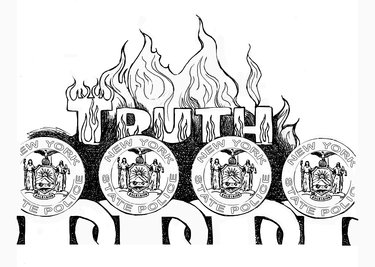The thin blue line should protect citizens
We heard the siren wail in the wee hours of the morning on April 17. We were still putting our weekly paper to bed.
A short walk down Maple Avenue and, just around the corner on Main Street, we came upon the cause of the commotion. We were shocked.
We could see the remains of a smashed and burned car, wedged between a pickup truck and an SUV.
We spoke with Altamont firefighter Paul Miller. He told us the Altamont ambulance had come and gone; there was no one to tend to. The driver had left.
It seemed impossible that someone could have walked away from such a crash.
In the days that followed, we got calls and visits to our office, from villagers wanting to know who was driving the speeding Mustang that had moved and smashed two hefty, parked vehicles.
As we waited for the reliable Captain Curtis Cox of the Guilderland Police to answer our questions, we talked to villagers who had been awakened. One told us what woke him was not the crash, but the whoosh of a speeding car “going at breakneck speed.”
In the light of day, we looked closely at the pavement where the crash occurred and could see no black tire marks, no sign of a driver trying to stop.
Cox told us the Mustang’s owner was Christopher Nations of Altamont and that his car did not burst into flames on impact, but caught fire later, giving him a chance to get away.
Nations left the scene and was not found in a police search, said Cox; he turned himself in at the Guilderland Police station at about 6 on the evening of April 17.
He was ticketed for imprudent speed and for leaving the scene of an accident.
Cox did not mention that Nations is a State Trooper. We learned that from the owner of one of the smashed vehicles. We confirmed that with Cox and asked if the Guilderland Police handled the case differently because Nations was a State Trooper.
“No,” said Cox. “It shouldn’t make any difference at all.”
Good answer.
Cops shouldn’t be above the law or treated any differently than an everyday citizen.
If anything, they should set an example of prudent behavior, whether on duty or off.
Racing through the village’s main thoroughfare at breakneck speed — when the legal limit is 30 miles per hour — is not prudent behavior. As we drive home after a long night’s work, we often see joggers out at that hour as well as other drivers on the road. How lucky it was no person was in the Mustang’s path as it blazed through the village.
What happened next, as we pieced together the story, troubled us. We called Troop C in Sidney where Nations was stationed after graduating in December from the Basic School of the New York State Police Academy to ask about Nations’s current work status and about any internal investigation.
“We don’t comment on anyone who works as a Trooper,” said Trooper Nathan Riegal who is in charge of public information for Troop C.
Troopers, like all police, are public servants. The public has a right to know about their reliability.
Darcy Wells, director of Public Information for the State Police, responded to just two of the eight questions we e-mailed to her.
“All I can say is he was suspended and ticketed for leaving the scene and for speed that was unreasonable and imprudent,” she said. “He’s not out there actively representing the State Police.”
She did confirm that, in addition to the Guilderland Police investigation, in such a situation, “We would conduct our own investigation.” She also declined to comment on general State Police procedures for investigation and discipline.
Here are some of our unanswered questions:
—Why was he driving so fast?
— Why didn’t he brake?
— Were drugs or alcohol involved?
— Why couldn’t the plate, clearly visible on the back of the car, be run and the owner easily ascertained?
— Why did police wait until Nations turned himself in, 15 hours after the crashes, to make the arrest when, they said, it was then too late to run tests for drugs or alcohol?
— While alcohol may leave the system within hours, couldn’t tests be done for drugs that remain for days?
Is the lesson to be learned from this: If you’re in a bad crash, run away until you can’t be charged with a more serious offense?
We sincerely hope not.
Such a tactic, were it to succeed, would place us all in peril.
— Melissa Hale-Spencer



